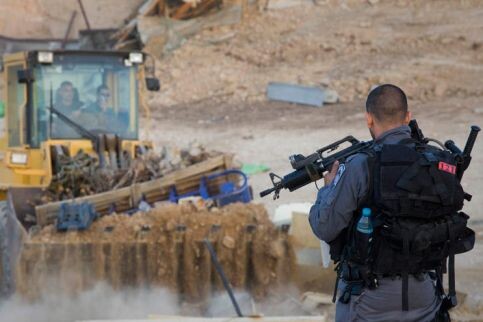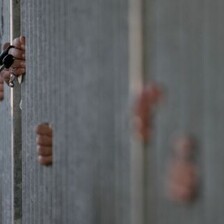The Electronic Intifada 19 August 2010

Israeli authorities have already demolished al-Araqib village three times and villagers fear they will do it again. (Oren Ziv/ActiveStills)
JERUSALEM (IPS) - On the eve of the start of Ramadan last week, Israeli police demolished the Bedouin village of al-Araqib in the Negev desert. It was the third time within two weeks that the village had been razed.
Unfazed, the Bedouin villagers immediately began rebuilding.
“We have already put back up some twenty of our huts, and we’re putting up more every day — despite the fast,” village leader Sheikh Sayyah Abu Drim told IPS when reached by telephone a week after the last police action.
“We have nowhere else to go,” said the Sheikh. More than forty families live in al-Araqib.
At dawn last Tuesday, Israel Land Administration (ILA) officials, accompanied by a large police detail including more than 100 border guards and mounted police, began their operation with the support of two bulldozers.
The police removed water tanks and the remains of several dozen makeshift structures that had been erected since the previous demolition only last week. Dozens of families including infants and elderly people were forcibly removed.
In a nonviolent protest, a score of Israeli Jewish activists who had slept in the village in solidarity tried unsuccessfully to stay the police action.
“Who will reap all this hatred?” asked legislator Talab al-Sana, a Palestinian citizen of Israel, arriving on the site. “The government found a solution for the Jewish settlers who were evacuated from Gaza [as part of Israel’s 2005 unilateral withdrawal from the Palestinian area]. Why not here?” said al-Sana.
After the previous forced eviction, Ilan Jan, an ILA official, said, “It is a test of their spirit. We’re doing our job. Now, we’ll file a claim against the illegal occupiers for the costs of the evacuation.”
Another ILA official, Ortal Tzabar, confirmed that 850 olive trees had been uprooted and would be “replanted elsewhere.”
Al-Araqib sits between the Israeli desert town Beersheba and the state-built Bedouin town Rahat. The al-Turi family says its members have lived on the site since the 19th century and that since then they have worked the land and paid taxes, that both Turkish and British documents testify. There is an old cemetery on the site.
“Tearing down an entire village and leaving its inhabitants homeless without exhausting all other options for settling longstanding land claims is outrageous,” Joe Stork, deputy Middle East director of Human Rights Watch, said in a statement.
Israel police spokesman Mickey Rosenfeld maintained the police were simply acting on a court order issued 11 years ago but not executed. Rosenfeld added that that the al-Araqib residents were moved to an area close to Rahat where, he claimed, they had homes.
In 1951, three years after Israel’s creation, the al-Araqibs, like many other Bedouin communities, were removed on the grounds that the area would be used for military training.
They were promised that their removal was only temporary and that they could return in six months. They have never been allowed back, but were allowed to graze their flocks. Several families returned to live on their land just over a decade ago.
“We are not invaders, nor squatters,” said Sheikh Sayyah. “It is the state that has invaded us.”
The repeated demolitions of the village have taken place despite the fact that the ownership issue is the subject of a complex court case before the Beersheba District Court.
Academic experts have already testified in court to support residents’ land ownership rights.
An estimated 90,000 Bedouin citizens of Israel, indigenous inhabitants of the desert region of the southern part of the country, live in “unrecognized” villages like al-Araqib. These villages do not appear on official maps though some existed before Israel was established in 1948.
Because the government considers the villages “illegal,” they do not enjoy basic services such as water, electricity, sewage treatment and garbage disposal. As a result they risk being destroyed at any time.
ILA officials contend that they are simply enforcing zoning and building codes, and insist that Bedouin can relocate to seven existing government-built townships townships or to a handful of recently recognized villages.
Coinciding with the time that al-Araqib was razed for the second time, Israeli Prime Minister Benjamin Netanyahu spoke during a cabinet meeting of the “threat of losing a Jewish majority in the Negev.”
Most Beduoin youth serve voluntarily in the Israeli army. Yet, when addressing the issue of loyalty to the state pending a new citizenship law, Netanyahu was quoted as saying, “We are under real attack on this issue [of Israel as a Jewish state]. Different elements could demand national rights within Israel, for example in the Negev, if we allow a region not to have a Jewish majority. It has happened in the Balkans, and it is a palpable threat.”
One of the villagers, Salim Abu Midyam, expressed anger that the Israeli authorities had undertaken their demolition of al-Araqib on the eve of the Muslim holy month. “We will continue to cling to the land of our forefathers and rebuild our village until our right to live here is recognized.”
An ILA official had told reporters on the site, “This is state land, set aside for the grazing of Bedouin flocks, not for houses. The al-Turi clan insists on remaining on the site. We will not capitulate to them. We’re trying to show sensitivity, but if we need to demolish on Ramadan, so be it.”
Yaakov Manor, a Jewish activist with the Forum for Coexistence in the Negev told IPS he does not believe the police would actually demolish the village during Ramadan for a fourth time.
Sheikh Sayyah was more skeptical: “Three times they brought us presents just before the holy month. You really believe they won’t bring us a fourth present during the Holy month itself!”
All rights reserved, IPS — Inter Press Service (2010). Total or partial publication, retransmission or sale forbidden.




